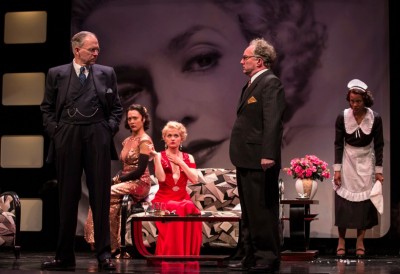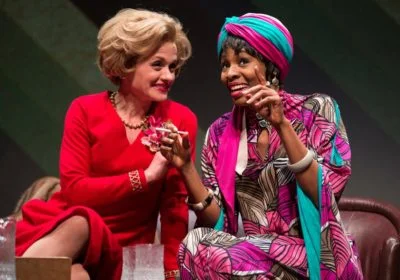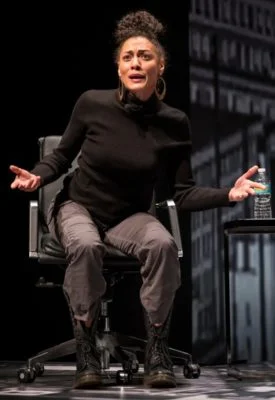By the Way, Meet Vera Stark
Directed by Chuck Smith
Produced by the Goodman Theatre
For all its Tinseltown charms, Meet Vera Stark just doesn’t twinkle…
So what can we say about the Chicago premiere of playwright Lynn Nottage’s By the Way, Meet Vera Stark? Well, for starters, its funny, alarmingly smart, and beautifully conceived under Chuck Smith’s current direction at the Goodman Theatre.
But given all that, why doesn’t it work?
 The reason, I suspect, is that there’s a caustic acidity to Nottage’s humor not quite set up properly in the play’s opening act, making it sound on the whole like the clever punchline to a joke never explicitly asked. The press releases for Vera Stark insist it’s a play about “the grotesque and stereotypical ways African Americans were portrayed” in Depression-era Hollywood, and the dramaturgical notes lining the program make ponderous references to such legendary black actresses of the period like Hattie McDaniel and Ethel Waters.
The reason, I suspect, is that there’s a caustic acidity to Nottage’s humor not quite set up properly in the play’s opening act, making it sound on the whole like the clever punchline to a joke never explicitly asked. The press releases for Vera Stark insist it’s a play about “the grotesque and stereotypical ways African Americans were portrayed” in Depression-era Hollywood, and the dramaturgical notes lining the program make ponderous references to such legendary black actresses of the period like Hattie McDaniel and Ethel Waters.
But if Nottage’s point were simply to excavate from the disintegrating reels of celluloid past images of hard-working black actresses compelled by racist movie moguls and directors to play doltish maids and drawling “Mammies,” and then hold up those images to the scrutiny of modern sensibilities, then the playwright’s point has been sufficiently made twice over by the time intermission rolls around.
And in fact, the first act skips by playfully enough as a lighthearted (though shrewdly self-aware) piece of satirical comedy. After introducing us to the ambitious black actress Vera Stark (Tamberla Perry)—working at first as a maid to “America’s Sweetie Pie,” the film actress Gloria Mitchell (Kara Zediker)—we learn that Mitchell is coming up for the star role as a Southern debutante in director Maximillian Von Oster’s new historical epic, The Belle of New Orleans. Stark, who knows an opportunity when she sees one, begs her “boss” to recommend her for the part of the grateful slave, Tilly. But Mitchell’s too self-obsessed (and maybe a little reluctant to share the limelight) to lift a finger, meaning if anything is to happen, Vera must take matters into her own hands.
So when the German Von Oster (Ron Rains) announces at Mitchell’s lavish Hollywood party that his upcoming movie must be “thoroughly authentic”—that it must capture the “negroes of the earth…who have felt the burden” of slavery and in whose voices once can still hear “the music of the fields”—Vera rears up for the audition. Whilst serving drinks, she thus suddenly bends low under the weight of her “oppressed Louisiana upbringing,” regaling in a feigned Delta drawl Von Oster and movie mogul Frederick Slasvick (Patrick Clear) her “tragic story,” all before breaking down under the expressive weight of some (bad) impromptu blues. The whole episode, to be sure, is pure spectacle. But Stark wants the part. And the joke, of course, is on Von Oster, who no sooner is confronted with this hollow racial stereotype than he thinks it the “realest” thing he’s ever seen.
Of course, a sophisticated Chicago audience is already in on the joke, and that’s part of what makes it funny. We can laugh at Stark’s grotesque contortions because sufficient enough distance separates our supposedly liberal modern attitudes with those of Nottage’s characters. Besides, there’s enough role-playing dispersed throughout this cast of Hollywood phonies. Stark’s friend Anna Mae (Amelia Workman), for example, is pretending to be a high-minded Latin American actress in order to cozy up to Von Oster, and even Mitchell’s face is frequently stretched from ear to ear in the feigned toothy smile of a dutiful Hollywood starlet. But because Vera’s willing acceptance of a stereotype offends not just herself but also that of an entire people, it rightly assumes the forefront of our attention. Still, we’d be mistaken to think she’s the only one performing for the white dudes in the room. And that seems to be Nottage’s point.
Or at least it does until the second act. Framed as a modern-day retrospective on the boundary-breaking career of the elusive actress, Vera Stark, it features three crudely drawn intellectual types (Chiké Johnson, Taron Patton, and Amelia Workman) as they attempt to excavate from the vague historical record an image of the real Vera Stark. Inset into their academic-style panel discussion is the elderly film starlet’s final 1973 interview with talkshow host Brad Donovan (Patrick Clear), which by coincidence features a reunion with her The Belle of New Orleans costar, Gloria Mitchell.
The Brad Donovan interview feels like a rickety roller coast ride, with the slightly inebriated Stark shifting unpredictably between a defensive reticence and a stagy self-performance. After forty odd years, Stark is still most comfortable when doing some put-on version of herself, and the presence of her old friend Mitchell only makes her feel cagey and unable to “act” her way out. Oddly enough, only here does Nottage finally decide to reveal a somewhat more complex personal history between Mitchell and Stark (paired together at various times as sisters, potential cousins, and even lesbian lovers). At the very least, their friendship has deeper roots than once thought, though at this point in Vera Stark we are disinclined to care. Their friendship by 1973 appears to be unsalvageable, and thus what could have been effective stakes to keep the dramatic pace rolling instead bounces back and forth between wildly exaggerated emotional highs and slogs of awkward subtext.
And to be honest, I’m not convinced that Tamberla Perry is quite up for the challenge of seeing Vera Stark through to completion. She demonstrated a strange tendency—on more than one occasion—to suddenly “play out” to the audience, as though always checking the barometer of the room. Hesitant to slip any deeper in Stark than could readily be managed by her highly self-conscious technique, Perry never fully embodies the darker nuances of the older Vera that—in this production anyway—still lie dormant in Nottage’s script. Projecting at disproportionate levels to those even around her—again, signaling a distinct uncomfortableness on the Goodman’s main stage—one can only hope that over the course of Vera Stark’s run, Perry will settle more easily into her role and thus allow what are clearly her natural gifts to shine through.
Still, what struck me as most problematic about the second act was Nottage’s panel of public intellectuals—activists, writers, and film people—who together comprise Vera Stark’s grossest caricatures. Expressing themselves in spontaneous outbursts of spoken word, penning books on “parenthetical” black identities, prefacing their remarks with their curriculum vitae, and dressing in the showy uniforms of the “radicalized” classes, one can only take their smugly self-assured pontifications on Vera Stark, racial stereotypes, and black identity as gross parodies of the selfsame liberal sensibilities that underwrote so much of the first act’s sense of humor.
And suddenly, the audience—which had previously shared in on Nottage’s joke at Von Oster’s expense—becomes the joke in a weird way, with Nottage’s soft-spoken invective heaped without reservation onto their onstage surrogates. Tellingly, the audience eager to laugh at the phoniness of 1930s Hollywood is less eager to laugh when that phoniness is reflected right back at them. Nottage’s point is a clever one and definitely more sophisticated than Vera Stark’s first act may lead us to believe. Still, it ultimately results in a subtle shift in tone and mood that the play never quite recovers from.
 And in the end, I’m not sure that Riccardo Hernandez’s scenic design helps bring out the subtleties of Vera Stark either. Replete with a gaudily lit Hollywood sign traversing the whole of the stage (the purpose of which, I suspect, was to cut the proscenium arch in half so as to better frame the scene), the Goodman’s stupendous resources in this instance only overwhelm and sensationalize what should have been a more deliberate and focused production.
And in the end, I’m not sure that Riccardo Hernandez’s scenic design helps bring out the subtleties of Vera Stark either. Replete with a gaudily lit Hollywood sign traversing the whole of the stage (the purpose of which, I suspect, was to cut the proscenium arch in half so as to better frame the scene), the Goodman’s stupendous resources in this instance only overwhelm and sensationalize what should have been a more deliberate and focused production.
Thus it would seem that we are still waiting. Waiting for someone to come along and finally excavate an image of the real Vera Stark.
SOMEWHAT RECOMMENDED
Reviewed by Anthony J. Mangini
Reviewed Monday, May 6th, 2013.
Running time is approximately 2 hours and 30 minutes with one intermission.
By the Way, Meet Vera Stark runs until June 2nd, 2013. The Goodman is located at 170 North Dearborn. For tickets call (312) 443-3800. Check out their Theater in Chicago listing at https://www.theatreinchicago.com/by-the-way-meet-vera-stark/5761/.

